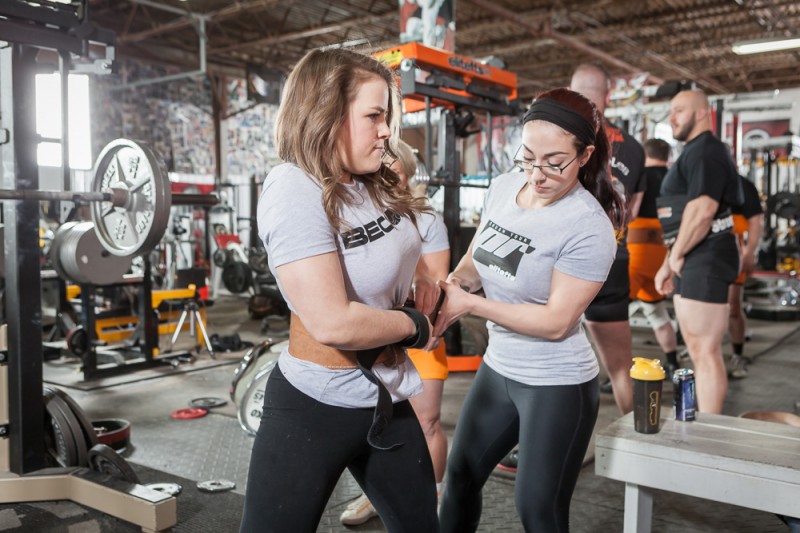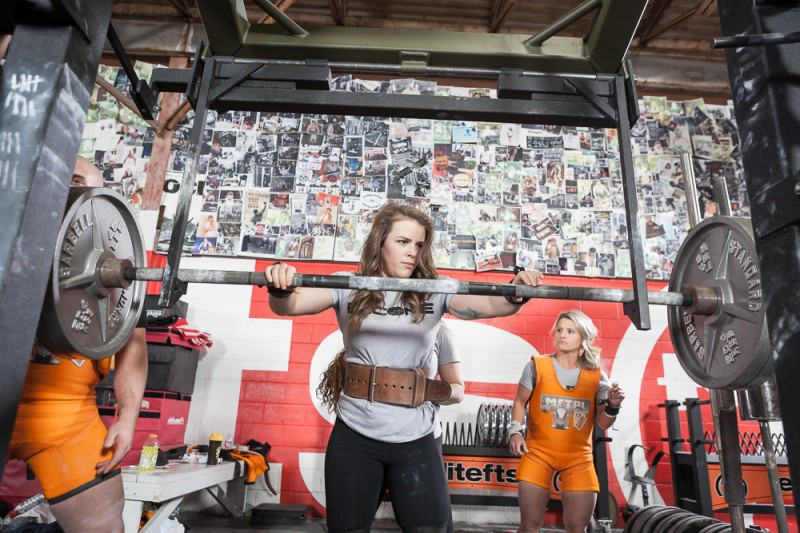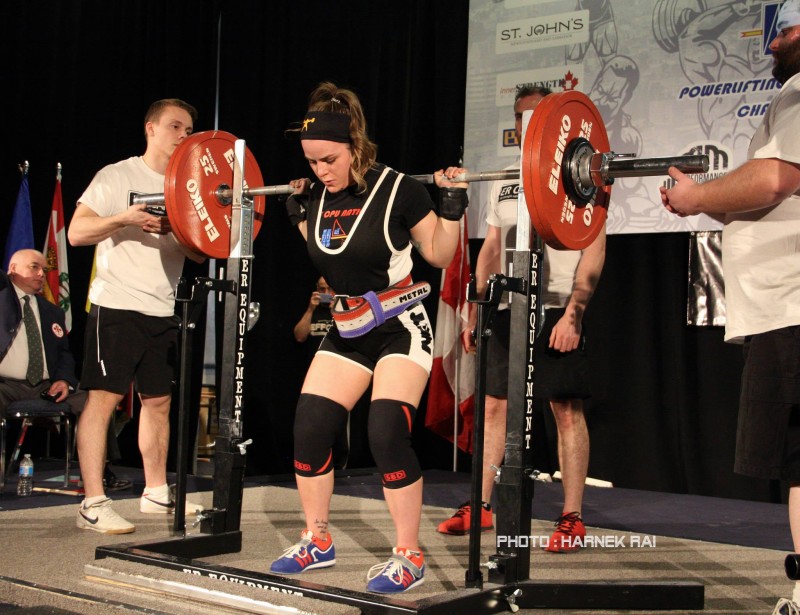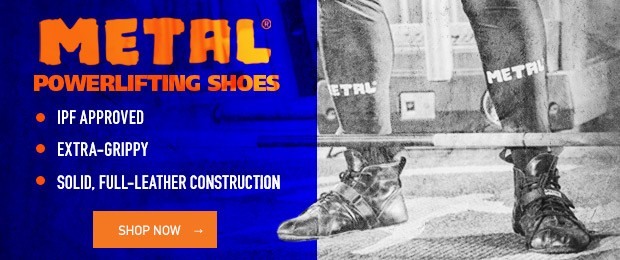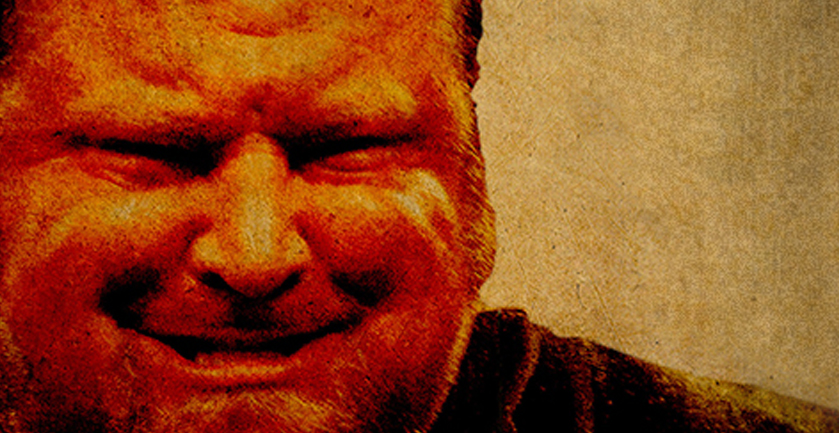
I was recently having a conversation about picking openers for competitions and it seemed like a great topic for an article. A big reason I thought this is because of all the theories on the subject I have heard over the years and all those theories I have seen in action. It appears to me that there is no correct set of standards when it comes to picking good openers. There are just too many differences between lifters, training programs, and especially different mentalities between lifters. I do, however, think there is some common ground when looking for the best way to go about picking openers. There are many things that should always be thought about and taken into consideration during the process. Like most areas in strength training, it is not rocket science, but there needs to be some level of intelligence and thought.
When to actually attempt openers seems like a good place to start. In my heaviest competition days I would try my openers in the sixth week from the meet. On the flip side, I have seen people do it during the second week from the meet with success. This is a very wide spectrum of time. So why did I do mine so far out and why have some others picked theirs so close? I mostly trained conjugate method, where I was trying to increase my strength on a progressive curve unlike a linear periodization type programming. This meant my strength gains from week six to meet day where not huge.
RECENT: Three Training Methods to Strengthen Your Weak Points
Conjugate also meant I was continually changing my max effort lifts so I was not doing the three main lifts very often in my max effort work. Plus, I have a great deal of experience under my belt and I know my body very well. Simply put, hitting openers on the sixth week out works well with my schedule and my pre-meet training. For example, I would take one to two weeks off before the meet and I liked to have my last training week be speed/dynamic work. This also gave me the option of moving opener attempts to four weeks out if for some reason something went wrong and I could not test them on week six. I preferred to hit them on week six but week four would still be okay if needed.
With linear periodization, the percentage of weight is increased while reps are dropped off trying to peak one rep max strength on meet day. This makes your options more limited for trying to find a good time to try openers. Some lifters will hit their openers a week out from the meet depending on how they set up their periodization. Some other lifters may have an idea of what percentage of their max they want for their openers so they will be able to feel that opening weight according to their periodization. There is still a whole spectrum in the middle that I have seen other lifters pick to test their openers. It all depends on their programming, experience, and simply personal preference.
The time you choose to try your openers is still very important, even though there is a wide range of time you can do it. Don’t just randomly pick a time to try your openers. Put some thought into it.
I think one of the most important things to consider is recovery time. Testing any one of the main three lifts in full range puts a lot of exertion on your body. This is especially true when you have no idea what you will open with. In this case, you may end up going heavier than you expected, trying to find that perfect opener. Always keep in mind that the goal is to be at your freshest and one hundred percent recovered on meet day. Don’t put yourself in a bind trying to hit your openers too close to the meet where you do not have time to fully recover from attempting them. I feel it’s better to take them a little further out to give you more time to recover or to give you options if something happens and you cannot take them on the planned day.
Experience plays a role in picking when to hit openers also. I recommend beginner lifters hit their openers a bit further out in the range of two to four weeks, because they generally do not know their bodies as well and I think it is a little easier mentally. When to hit or try openers should be thought about when a lifter is setting up their programming for the meet. Programming is about more than just peaking strength.
How you take your openers in training is extremely important, too. This again holds truer for the non-experienced lifter. Make sure to pay attention to the warm-ups you do and the increases in weight you take. Do not do 25-pound and 45-pound plate jumps to hit your opener if you plan on doing only 45-pound plate jumps at the meet. Keep track of the jumps you make even if you have to write them down and then stick to that plan in the competition.
Keep in mind that you will only get a certain amount of time to warm up in the meet, so try to mimic that. Too often I see lifters rushing in the warm-up room all worried about hitting their warm-ups because they did not plan effectively. For the non-experienced lifters, I recommend trying to find a more knowledge lifter to help with this. I lean towards keeping warm-ups going fairly quickly when attempting openers in the gym because you never really know what the meet will be like. It’s always a bit easier to slow your warm-up at the meet than to speed it up.
MORE: So You Made Weight, Now What?
Do not overexert yourself during warm-ups either. You are just trying to warm the body up and feel the weight. Do lighter weights for higher reps if you need to warm the body more, and once the weight starts increasing drop the reps way down. I always warmed up with the empty bar to 225, after that is no more than triples down to singles. On the day you test your openers, come in with the mindset that it is the meet day. Don’t get yourself too worked up during warm-up, but stay focused. Remember in the meet you will be warming up with multiple people on limited equipment so keep that in mind when doing your warm-ups in training. You want to be prepared for that chaos so it does not throw you off. Don’t attempt your opener like it is just a training day; treat it just like the meet.
Take it serious and mentally put yourself at the competition knowing you want to hit it on the first try. If you miss your opener, it is like wasting an attempt, so take it serious. Also take note of when your adding gear (belt, wraps, briefs, suit, etc) so you can do it exactly the same at the meet. Again, write this down if you need to. The better you can mimic the meet in training the more likely you will be able to handle the meet strong.
A powerlifting competition is done in one day, so should all openers be hit in one day? This is something I have always questioned. I have never actually tried all my openers in one day, though. I train with mostly bench days and then squat/deadlift days. I have always just planned my openers around that. So I usually do one opener on one training day but have on occasions done my squat and deadlift openers on the same day. It just seems to be the way lifters have always done it.
This still leaves some things to be considered, though. The biggest question is how fresh you are when you’re taking your opening attempts and how fresh will you be at the meet. This relates to how intense your current training is when testing openers and what order the lifts are in. For example, the bench press is the second lift (after the tough squats) in the meet, but when it is done in training it is your first lift of that day. That will undoubtedly be more stress on your body compared to just warming up and benching at the gym. This can leave some argument for hitting all openers in one day but the stress level is still different because there are no second attempts done when just hitting openers.
I say stick with hitting them in different training days but stay aware that doing them in the meet is very different. Just because you walk in fresh and smash an opener does not mean it will go the same in the meet. Meet days can be long and grueling. They can take a toll on a lifter mentally and physically, so keep all this in mind when settling down on opening weights.
There are still many other things to consider when picking your openers. A lifters mentality and ability to deal with stress is a big one. Are you a gym lifter or a meet lifter? How do you do under the pressure of actually having to do a clean lifter with three judges right there?
I have always been a meet lifter and have always done much better in meets than training. I seem to thrive on pressure but some other athletes do not do as well. From years of experience, I know I will be stronger and lift better on meet day than I do in the gym. I am also able to stay very calm before the meet and throughout my warm-ups, whereas some other lifters burn a ton of energy up during this time. Their minds are going a million miles a minute and their bodies are fidgeting all over the place.
This is not the worst things in the world, but if you are like this you need to take it in consideration. The opener you hit in the gym may feel a whole lot heavier in the meet because of all the extra energy you have used up. This type of lifter may want to open with something a bit lighter to adjust for this. I would also recommend this lifter work to improve this, but that is another article.
Each lifter needs to consider their mental strengths and weaknesses. For example, if I open too light I tend to play around with my opening attempt and end up wasting more energy than just getting the lift done. I like to open with something that is a bit challenging. I want a weight I am confident I know I can get but a weight that is heavy enough I know I can't play around with. Some lifters need a little lighter opener to help them work through the initial jitters of a meet. Some lifters want the heavy pressure right from the start and they do well with that. Some lifters need to build into the pressure. There is always pressure at any competition and you need to make it work in your favor.
The opener is not the end all, be all of the meet; it is just a start. That being said, it sets the tone of the meet for a lot of lifters. I have seen lifters miss their opener and it’s all over for them mentally. Other lifters like myself do not really care either way. If I miss an opening attempt, it doesn't affect me much. I am not saying either way is right or wrong. What I am saying is to be strong enough to recognize the lifter you are right now (you can still train to become mentally stronger). If dropping your opener some gives you a stronger mentality for the meet, do it. If you are the lifter that has to get into the meet for sure on the first lift, make sure that happens. It does not matter what you open with, only what you finish with.
RELATED: Cus D’Amato — Past, Present and Future Thoughts
Another big consideration is how recovered you are when you attempt your openers and how recovered you are meet day. Like I said earlier, your goal is to be one hundred percent on meet day. Generally speaking, openers taken during heavy training periods when your body is taxed from training should feel considerably lighter on competition day because you are fully recovered. Of course, like I said earlier, there is the consideration of which lift and how much energy you have already spent competing. Personally I hate when an opener feels too light. It feels like a wasted attempt to me. So if I get a good opener in training and then totally smash it in the meet because I am fully recovered, I get a bit pissed at myself. Maybe a heavier opener would have set me up for a higher finishing lift.
It is important for lifters to think about how they feel the day they test their openers. Is it during really heavy training? Is it after a lighter week or a deload week? Was there anything out if the ordinary going on in their life? If I test an opener that feels a bit heavier than I like, I may still stick with it if training has been extreme. This is because I should be fully recovered at the meet which should make it feel that much lighter or make me feel that much stronger. Anything can happen but I find it best to consider every factor and to try to control as much as possible. The more experience you have, the better you will get at seeing all these factors.
What is the worst case scenario? There are always some factors we cannot change, so sometimes it is good to consider that worst case. As I have already said, the goal is to have an amazing training cycle and be one hundred percent on meet day, but there is no guarantee of that. You could get to the meet with an injury, you could get sick, you could have major trauma in your life, etc. These are things we cannot always control but we can deal with them the best way possible. Depending on your federation you can change your openers up to a certain point in the meet. It is worth learning the rules of whatever federation you choose and if you need to change openers then do it. If you’re having troubles in warm-ups or something is not right, there is still that opportunity to change them. I am not saying to jump ship right away and change them, but there is a safety net if you really feel you need to.
Photo courtesy of Harnek Rai
I am stubborn and I go to a meet with numbers in my head. I am willing and have risked not changing them before. Sometimes it was awesome and other times I crashed and burned, but I always accepted the risk. There are times where it is more important to just do the best possible that day and that may mean dropping the openers. On the flip side, maybe you are rocking one hundred percent where everything feels light and you underestimated how strong you would feel. You can always increase an opener too. This is not something I like to use often but it is there and some lifters do not realize that.
With strength training, we are always working to get stronger. Sometimes these gains are slow and sometimes they come very fast. Do not get caught in the past when picking your openers. Your past openers are just that: the past. I have seen lifters open too heavy and too light. Often times this is because they focused too much on their past openers. Maybe you had some setbacks in training and the smart move is to open lighter than you have in the past. I understand that for an aggressive person, just the thought of this sucks, But again, it’s not where you start but where you finish. One of my pet peeves is when lifters open way too light because they are stuck focusing on what they lifted in the past. I have actually gone to meets and opened with PRs. It was irrelevant that it was a PR (in terms of PRs) because I had plenty of strength to do it as an opener. Sometimes gains come fast, so don’t hold yourself back by thinking too much about your past. Your openers are based in the now, where your strength is for the current meet.
There are many ways lifters go about picking their openers and I admit my way is not for everyone. I would still argue there is something to be learned from how I do it. I like to pick my openers a bit further out from the meet than most lifters. I do this because it gives me a good idea where I am at. It helps me with finding weak links. It gives me a chance to have a backup plan if needed. It also helps me with recovery for the meet and the last month or so is more about recovery than anything else in my program.
I always want my openers to be hard but definitely doable. I do not want anything too heavy or too light. I need that little bit of stress to help me focus and get me pumped up for a great meet. I am without a doubt a meet lifter and have always performed much better under stress. I also like my opener to be a heavy and solid attempt because of how I plan my meet. I never figure on getting all three attempts because there are just too many things that can go wrong. I know people strive for making all three attempts but I do not. I want two attempts and a backup. I plan on my first attempt being a decent number and second hopefully a PR. This leaves an extra attempt after the PR if something went wrong, and if not I will do a huge PR attempt. With this plan, my goal total is based off two attempts.
Yes, this leaves my opener being a bit heavier than most people would be comfortable with, but it works for me. It also helps that I see every attempt as a complete individual entity. If I miss a lift, it means nothing to me because my next attempt is a completely different attempt. I know some people let a missed lift get in their head. For me, I know there is a reason I missed it and it does not affect my next lift in a negative way. Actually, I usually feel better about the next one because I know what to fix. I have also taken the time to learn how to compete and to control my energy level before the meet. Any energy expelled that does not help the main lifts is a waste. Conserve energy for the main lifts.
Experience is the best thing to help pick openers and this only comes from practice. Every training session and every competition is a learning experience that can help make the best decision when it comes time to pick openers for your next meet. I have never seen strength training as fully black and white because there are so many differences between lifters. I don't think picking openers is any different and for that reason, this is not an article on how to pick openers. When I have an athlete I personally work with, I can give them a very solid way to pick their openers. This article is more about trying to get lifters to think for themselves and to consider as many variables as possible. The best coach anyone can ever have is themselves, because no one should ever know you better than you know yourself. All lifters should strive to think, learn, and understand for themselves. Strength is not cookie cutter and in order to be the best you can be, you need to think for yourself. If you are lucky enough to have some great advisers on the way, that is even better.










